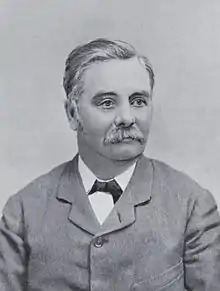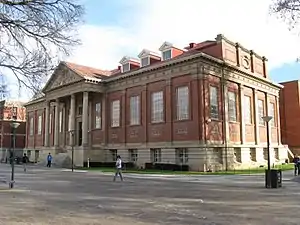Robert Barr Smith
Robert Barr Smith (4 February 1824 – 20 November 1915) was an Australian businessman and philanthropist.[1]

Smith was born at Lochwinnoch, Renfrewshire, Scotland, the son of the Rev. Dr Robert Smith, a Church of Scotland minister, and his wife Marjory, née Barr.[1]
Smith studied for a time at the University of Glasgow, but went into business and afterwards emigrated to Melbourne, where he was a member of the firm of Hamilton, Smith and Company in 1854. In 1855 he joined Elder and Company at Adelaide and became a partner in the business which from 1863 was known as Elder Smith and Company,[1] now Elders Limited.
Smith also took up land and became a large owner in South Australia, Victoria, New South Wales and Queensland. When the Wallaroo and Moonta copper mines got into difficulties, Elder Smith and Company made large advances to them until more profitable times came.
Smith made a name for himself as a financial authority, and though he declined to enter political or municipal life, his advice was frequently sought by politicians and members of the business community of Adelaide. It has been stated that in the 1893 bank crisis he was besieged by crowds of people seeking guidance.[2] Smith was on the boards of the public library and of the botanic gardens and was a director of several companies. He was a keen judge and lover of horses, his colours were frequently seen at race meetings in South Australia and Victoria, and he was president for a time of the South Australian Coursing Club.

Smith's private charities were very great, and he received a large amount of begging-letter mail. These letters were dealt with systematically and all deserving cases were helped.[2] Smith was a member of the Council of the University of Adelaide for nineteen years.[1] Among the larger sums distributed were £9000 to buy books for the University of Adelaide library, £10,000 to complete the St. Peter's Cathedral spires, £3500 for a steam life-boat and in 1908, £2300 to pay off debts on the Trades Hall.[1] Smith contributed largely to exploration funds, the observatory established on Mount Kosciuszko was paid for by him, and he was mainly responsible for the expenses of the first South Australian rifle team sent to Bisley.
Smith died of senile decay on 20 November 1915.[1] He married Joanna Elder, sister of Sir Thomas Elder, who survived him with a son and three daughters. Smith was an upright and modest man with intellectual sympathies. Smith shrank from publicity and he was said to have refused the offer of a knighthood. In 1920 his family gave £11,000 for the endowment of the library of the University of Adelaide and in 1928 his son, Tom Elder Barr Smith, born in 1863, gave £30,000 for the Barr Smith library building.
Family
- Brother-in-law: Sir Thomas Elder (1818-1897)[3]
- Son: Tom Elder Barr Smith (1863-1941)[4]
- Grandson: Sir Tom Elder Barr Smith (1904-1968)[5]
- Third daughter: Joanna Fitzgerald Barr Smith (1866 – ) married George Charles Hawker, jun. (c. 1854 – 15 February 1889), son of George Charles Hawker, in 1886.
- Fourth daughter: Marjory Erlistoun Barr Smith (1868 – 3 August 1913) married William Mitchell on 18 January 1900
See also
References
- van Dissel, Dirk (1976). 'Smith, Robert Barr (1824-1915)'. Australian Dictionary of Biography, Volume 6, Melbourne University Press, pp 153-154. Retrieved on 20 September 2009.
- Serle, Percival (1949). "Smith, Robert Barr". Dictionary of Australian Biography. Sydney: Angus and Robertson. Retrieved 20 September 2009.
- Gosse, Fayette (1972) 'Elder, Sir Thomas (1818-1897)', Australian Dictionary of Biography, Volume 4, Melbourne University Press, pp 133-134. Retrieved on 9 July 2009.
- Linn, R W (1988). 'Smith, Tom Elder Barr (1863-1941)', Australian Dictionary of Biography, Volume 11, Melbourne University Press, p. 664. Retrieved on 11 July 2009.
- Shanahan, Martin. (2002).'Smith, Sir Tom Elder Barr (1904-1968)', Australian Dictionary of Biography, Volume 16, Melbourne University Press, pp 274-275. Retrieved on 11 July 2009.